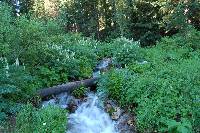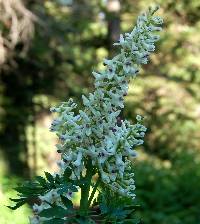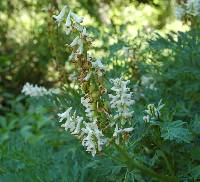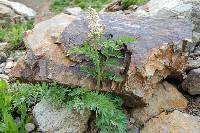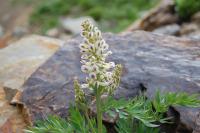Plants perennial, glaucous, from large, fleshy roots. Stems 1-several, 10-15 dm or more. Leaves ca. 5, compound, to 10 dm; blade with 2-4 orders of leaflets and lobes; ultimate lobes of proximal cauline leaves narrowly to broadly elliptic, 1-5 cm, apiculate. Inflorescences paniculate, 50 or more flowers on primary axis; bracts inconspicuous, linear or narrowly elliptic, rarely wider, proximal bracts ca. 10 mm, distal greatly reduced. Flowers ascending or spreading; pedicel 3-5 mm; sepals persistent, round and irregularly dentate to ovate, lunate, or attenuate-lanceolate with broad, sometimes lobed base, 2-3 mm; petals light pink to white, inner ones tipped reddish purple; spurred petal often incurved, 16-25 mm, spur tapered or not, 9-16 mm, apex obtuse, crest absent, inconspicuous, or extending into beak beyond petal apices, marginal wing narrow to broad, conspicuous; unspurred outer petal 10-15 mm; inner petals 7-12 mm, claw 3-5 mm; nectariferous spur 1/2-3/4 length of petal spur; style 3-4 mm; stigma roughly rectangular, with 8 papillae. Capsules reflexed, ellipsoid, 10-15 × ca. 3-5 mm. Seeds ca. 2.5 mm diam., with numerous minute protuberances.
Significant livestock losses have been caused by ingestion of Corydalis caseana , which is palatable to both cattle and sheep, despite the toxicity.



